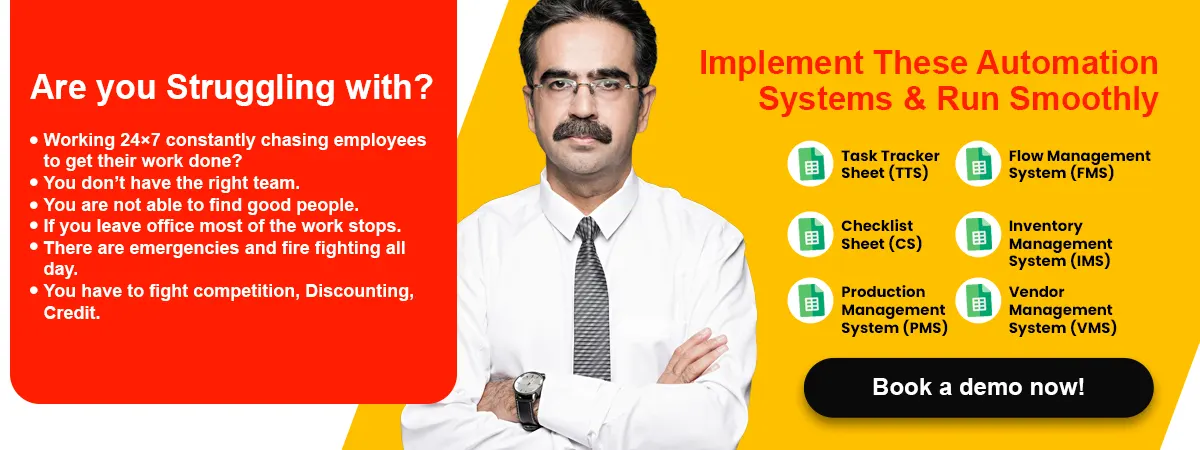by Subhadeep Chowdhury
Share

In today’s fast-paced business world, managing and optimizing resources efficiently is essential for staying competitive. Enterprise Resource Planning, often abbreviated as ERP, is a powerful solution that enables organizations to streamline their operations, boost productivity, and achieve long-term success. This blog will delve deep into the intricacies of how enterprise resource planning works, shedding light on its core principles and functionalities.
ERP systems are not just software; they are the backbone of modern businesses, connecting various departments and automating processes to improve decision-making and overall performance.
So, whether you are a seasoned professional or a newcomer to the world of ERP, this comprehensive guide will provide valuable insights into how ERP can transform your organization.
Let’s embark on a journey to unravel the mysteries of enterprise resource planning.
Understanding the Basics of ERP
Before jumping to the part on “How Enterprise Resource Planning Works” Lets us have some basics understanding of ERP. So ERP, at its core, is a centralized software system designed to integrate and manage multiple business functions and processes across an organization. It enables efficient data sharing and communication between various departments, ensuring a seamless flow of information and resources. The primary goal of ERP is to enhance operational efficiency, facilitate informed decision-making, and provide a unified view of an organization’s activities.
The scope of ERP extends to virtually all facets of a business, encompassing areas such as finance, manufacturing, supply chain management, human resources, and customer relationship management. It acts as a digital backbone, connecting different functions and enabling data-driven insights.
Also read: The Importance Of Enterprise Resource Planning For Small Businesses
Key Components and Modules of ERP Systems
ERP systems are composed of various modules, each dedicated to managing specific business functions. Some of the core modules include:
Finance and Accounting:
- This module handles financial transactions, accounting processes, and financial reporting.
- It can manage accounts payable, accounts receivable, general ledger, and budgeting.
Human Resources:
- The HR module covers personnel management, employee records, payroll processing, and workforce planning.
- It helps organizations streamline HR operations, improve talent management, and ensure compliance with labour laws.
Supply Chain Management:
- SCM modules focus on optimizing the procurement, production, and distribution of goods and services.
- They help in demand forecasting, inventory management, supplier relationships, and order fulfilment.
Customer Relationship Management (CRM):
- CRM modules enable businesses to manage customer interactions, sales, marketing campaigns, and customer support.
- They enhance customer engagement, foster loyalty, and improve sales processes.
Also read: What Does Enterprise Resource Planning Involve?
Common Features of ERP Software:
ERP software typically includes a set of common features that enhance its functionality and usability. These features often encompass:
- User-friendly interfaces for different modules.
- Role-based access control to ensure data security and privacy.
- Real-time data updates to provide up-to-date information.
- Reporting and analytics tools for data-driven insights.
- Workflow automation to streamline business processes.
- Scalability to accommodate the changing needs of an organization.
These common features make ERP systems adaptable to various industries and business sizes, serving as a versatile solution for optimizing operations.
So, on a simple note, ERP is a comprehensive software system that integrates and manages multiple business functions to improve efficiency and decision-making. It consists of key components or modules dedicated to specific areas of operation and offers common features to enhance its usability and effectiveness. Understanding these basics is crucial for organizations considering the adoption of ERP solutions to transform their business processes.
Also read: What Is Business Process Reengineering In ERP?
How Enterprise Resource Planning Works?
-
Centralized Data Integration:
At the heart of any ERP system lies the concept of centralized data integration. It’s like having a digital nerve centre for your organization, where all critical data from different departments is stored, organized, and made accessible in real-time. This data includes everything from finance and human resources to supply chain and customer management.
Imagine a manufacturing company that utilizes an ERP system. When a new customer order is placed, the ERP software immediately updates the inventory, triggers the production process, and calculates the associated costs. Simultaneously, it checks employee availability and schedules the required workforce. All this happens seamlessly, without manual intervention, thanks to the centralization of data.
The centralization of data ensures that everyone within the organization is working with accurate, up-to-date information. This leads to better decision-making, reduced errors, and improved collaboration among departments.
-
Process Automation:
ERP systems are designed to automate repetitive and time-consuming tasks. This automation not only saves valuable time but also minimizes the risk of human error. Let’s continue with our manufacturing example.
In a traditional setup, employees would have to manually record the incoming customer orders, check inventory levels, and create production schedules. With ERP, these processes are automated. When an order is received, the system automatically checks the inventory, generates a production order, and schedules the production based on predefined rules and priorities.
Additionally, the ERP system can automate financial processes, such as invoice generation and payment tracking. This reduces the chances of invoice discrepancies and ensures timely payments, which is crucial for maintaining healthy vendor relationships.
-
Data Analytics and Reporting:
ERP systems are not just about collecting and storing data; they also provide robust tools for data analysis and reporting. These features empower organizations to make data-driven decisions and gain valuable insights into their operations.
For example, an ERP system can generate detailed reports on sales trends, production efficiency, or inventory turnover rates. These reports can be customized to meet specific business needs and can be accessed in real time. Managers and executives can use these insights to identify areas for improvement and make informed strategic decisions.
Moreover, ERP systems often come with built-in dashboards that provide at-a-glance information on key performance indicators (KPIs). This allows stakeholders to monitor the health of the business and take immediate action if any issues arise.
Also read our article on: Common Challenges Of ERP Implementation
-
Improved Communication and Collaboration:
Communication and collaboration are essential for any organization’s success. ERP systems facilitate seamless communication by connecting different departments and ensuring that they are working towards common goals.
Consider a scenario where a sales team receives an urgent request from a client for a customized product. With an ERP system in place, the sales team can quickly check inventory levels, production schedules, and resource availability. They can then collaborate with the production and procurement teams to expedite the order, all within the ERP system.
ERP also improves external communication by enabling better interactions with customers and suppliers. Customer relationship management (CRM) modules within ERP systems allow organizations to track customer interactions, manage leads, and provide better service. Similarly, supplier management modules streamline communication with vendors, ensuring a smooth supply chain.
-
Enhanced Resource Allocation:
Efficient resource allocation is a key driver of profitability. ERP systems help organisations allocate resources optimally by providing real-time insights into resource availability and demand.
For example, a retail company with multiple stores can use ERP to track the sales performance of each store in real-time. If one store is consistently running out of a popular product, the ERP system can automatically reorder stock to ensure shelves are always well-stocked. Conversely, if another store is overstocked with a slow-moving product, the system can initiate discount strategies to clear inventory.
Furthermore, ERP systems can assist in human resource management by optimizing workforce allocation. By analysing historical data and current demand, the system can suggest optimal staffing levels and help avoid overstaffing or understaffing issues.
-
Scalability and Flexibility:
As organizations grow and evolve, their business processes and requirements change. ERP systems are designed to be scalable and flexible, allowing businesses to adapt and expand without significant disruptions.
If a company acquires a new subsidiary, for instance, the ERP system can be configured to incorporate the new entity seamlessly. It can handle multiple currencies, languages, and regulatory requirements, ensuring that the business can continue to operate smoothly across borders.
Moreover, ERP systems can integrate with other software solutions and technologies, such as e-commerce platforms, IoT devices, and advanced analytics tools. This flexibility enables organizations to stay competitive and take advantage of emerging technologies without abandoning their existing ERP infrastructure.
NOTE:
In the fast-paced world of business, managing resources and operations efficiently is crucial for long-term success. Enterprise Resource Planning (ERP) systems play a big role in making this happen. Econstra, a top-notch business consultancy, is at the forefront of helping companies improve their processes. They specialize in providing systems that automate business tasks and workflows, making everything run more smoothly. Econstra’s goal is to help businesses use technology to manage their resources effectively and boost overall performance. With their tailored solutions, Econstra ensures that companies not only keep up with changes but also thrive in today’s competitive market. When it comes to ERP solutions, Econstra is a reliable partner for businesses looking to improve efficiency in workflow and business processes.
The Final Thoughts On: How Enterprise Resource Planning Works?
In conclusion, understanding how enterprise resource planning works is essential for any organization aiming to optimize its operations, enhance decision-making, and maintain a competitive edge in today’s business landscape. ERP systems are not just a piece of software; they are a comprehensive solution that centralizes data, automates processes, enables data analysis, and fosters collaboration.
By implementing ERP, businesses can streamline their workflows, reduce errors, and allocate resources more efficiently. Moreover, ERP systems are adaptable and scalable, allowing organizations to grow and evolve without disruption.
Embracing ERP is a strategic move that can lead to increased productivity, improved customer satisfaction, and higher profitability. As technology continues to advance, ERP systems will play an even more significant role in shaping the future of businesses across various industries.
So, whether you are a small startup or a large corporation, exploring the potential of ERP can be a game-changer for your organization.
STAY IN THE LOOP
Subscribe to our free newsletter.
In today’s dynamic business landscape, small businesses frequently seek the expertise of consultants to navigate challenges, streamline operations, and achieve strategic objectives. This comprehensive guide explores the diverse types of small business consultants, detailing their roles and how one can embark on a successful consulting career. What is a Small Business Consultant? A small business […]
Improve Your Cash Cow with Business Consultant in India In the ever-evolving landscape of business, ensuring the longevity and profitability of a key revenue stream—or “cash cow”—is paramount. Whether you’re a startup seeking stability or an established company aiming for sustained growth, leveraging the expertise of a business consultant in India can significantly enhance your […]
Are you an aspiring entrepreneur, eager to embark on the exhilarating journey of starting your own business? Or perhaps you are a seasoned business owner, constantly seeking new opportunities for growth and innovation? In either case, one universal truth stands tall amidst the dynamic world of business: the delicate dance between risk and reward. Every […]
In the fast-paced world of business, effective task management is key to success. Yet, many professionals fall into common pitfalls that hinder productivity and efficiency. Today, here, in this blog post, we will explore some of the common mistakes in task management in business and offer practical tips on how to avoid them. From overlooking […]





